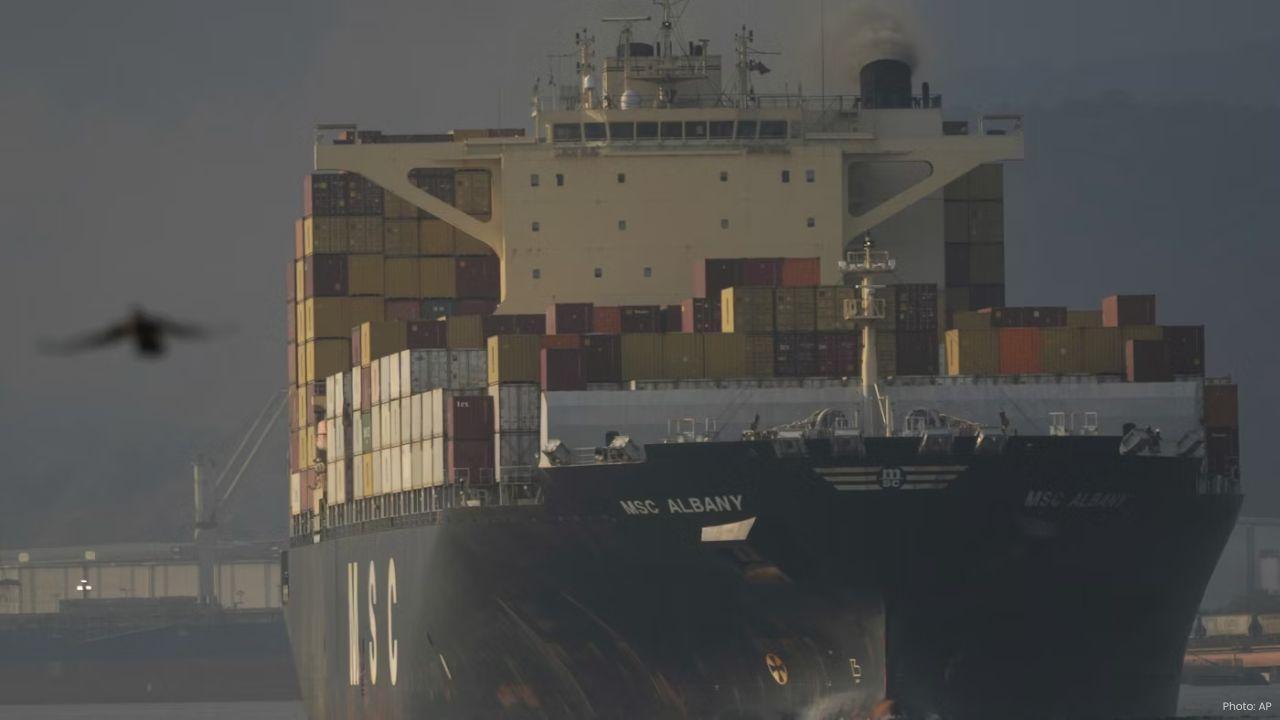
Post by : Meena Rani
Nearly 200 shipping companies have called on the world’s largest maritime nations to adopt the first-ever global fee on greenhouse gas emissions from ships, aiming to accelerate the transition to cleaner, low-carbon shipping. The call comes from the Getting to Zero Coalition, an alliance of companies, governments, and intergovernmental organizations, ahead of a critical International Maritime Organization (IMO) meeting scheduled in London from October 14 to 17, 2025.
The coalition is urging IMO member states to support a regulatory framework that would introduce a minimum fee for every ton of greenhouse gases emitted above set thresholds and implement marine fuel standards to promote cleaner alternatives. Jesse Fahnestock, who leads decarbonization work at the Global Maritime Forum, which manages the coalition, emphasized the importance of industry voices being heard during this pivotal political decision.
Industry Backing for the Proposal
U.S.-based shipping companies have expressed strong support for the initiative. The Chamber of Shipping of America has highlighted the need for a unified global system rather than multiple regional regulations, which could result in ships being double-charged for emissions depending on their routes. For the shipping sector, the regulations would provide the certainty required to invest in cleaner technologies, alternative fuels, and energy-efficient vessels, enabling the industry to meet long-term decarbonization goals.
U.S. Opposition and Potential Tensions
The Trump administration has unequivocally rejected the proposed framework, warning that it amounts to “a global carbon tax on Americans levied by an unaccountable U.N. organization.” U.S. Secretaries of State, Commerce, Energy, and Transportation have jointly stated that the United States may retaliate against countries supporting the proposal, citing concerns over “unattainable fuel standards and emissions targets” that could drive up shipping costs. They also argued that the regulations could disproportionately benefit China, which is a leader in producing cleaner fuels for shipping.
Global Shipping Emissions Context
Shipping emissions have risen over the past decade, now contributing about 3% of global greenhouse gas emissions, as vessels have increased in size, delivering more cargo per trip while consuming significant fossil fuels. The IMO has set a target for the sector to reach net-zero emissions by approximately 2050 and is committed to promoting the wider use of fuels with zero or near-zero emissions.
IMO
In April 2025, IMO member states agreed on the framework’s content, including minimum emission fees and cleaner fuel standards, but formal adoption requires a vote. If approved, the regulations will be mandatory from 2027 for large oceangoing ships over 5,000 gross tonnage, which account for 85% of international shipping emissions. Failure to adopt these regulations could significantly delay decarbonization and reduce the shipping industry’s contribution to global climate targets.
Despite U.S. opposition, most countries are currently supportive of the framework, signaling a potential historic shift for global shipping. Advocates say the decision will determine whether the maritime sector plays a fair and significant role in limiting global heating to safe levels. Shipping companies and environmental coalitions alike emphasize that adoption will enable meaningful investments in low-emission technologies and mark the beginning of a sustainable transformation in global shipping.
Global shipping emissions, IMO regulations 2025, greenhouse gas fee










Bengaluru-Mumbai Superfast Train Approved After 30-Year Wait
Railways approves new superfast train connecting Bengaluru and Mumbai, ending a 30-year demand, easi

Canada Post Workers Strike Halts Nationwide Mail and Parcel Services
Canada Post halts operations as CUPW strike disrupts mail and parcel delivery nationwide amid disput

PM Modi Launches BSNL ‘Swadeshi’ 4G Network, 97,500 Towers Built
India enters global telecom league as PM Modi inaugurates BSNL’s indigenous 4G, connecting 26,700 vi

India’s Iconic MiG‑21 Takes Final Flight After Six Decades of Service
After 60 years India retires its MiG‑21 fighter jet, a legendary yet controversial warplane marking

Hindustan Zinc unveils AI hotspot monitoring at Debari smelter
Hindustan Zinc launches AI-powered Switchyard Hotspot Monitoring at Debari smelter to cut outages bo

Chinese experts worked inside sanctioned Russian drone plant
Chinese drone specialists visited IEMZ Kupol supplying parts and drones via intermediaries, deepenin